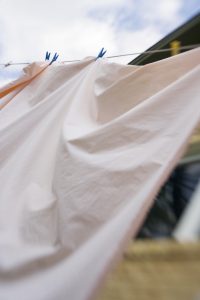Sooner or later it has to be dealt with: the laundry. The typical American household does almost 400 loads of laundry a year*, or an average of 7- 8 loads of laundry a week. Saving just a small amount of money on each load of laundry can add up to substantial savings over the years.

In my house, we do only half the average amount of laundry – usually 3-4 loads a week. I often substitute vinegar or baking soda for fabric softener. I have usually been pleased with myself for being so frugal and saving a bit of money on each load.
One day while I was in the laundry room and thinking about the actual cost of vinegar and baking soda, a vague uneasiness began to settle in. How could it be cheaper? It began to bother me. Did it really save money to use vinegar or baking soda instead of fabric softener?
I decided to find out.
I’ve posted the calculations and pricing details in an article on The Fat Dollar site – Making Homemade Fabric Softener with Baking Soda or Vinegar – Does it Really Save Money? . I’ll just give the results here.
It’s not what I wanted it to be, but more or less what that uneasy feeling told me to expect.
The results of the math showing the cost per rinse load:
Fabric Softener – Cost is $.04 * to $.08** per load
Vinegar – Cost is $.06 (using 1/2 cup) to $.11 (using 1 cup) per load
Baking Soda – Cost is $.12* to $.24** per load
Fabric Softener
*Sam’s Club Members Mark Brand
**Final Touch Ultra
Baking Soda
*Sam’s Club
**Walgreens
Vinegar could be possibly less expensive than fabric softener, assuming that you use only 1/2 cup and compare it against the most expensive brand of fabric softener (Final Touch Ultra in my case). Even then, the savings are only $.02 per rinse load.
Using baking soda instead of fabric softener is a downright luxury if you use costs as an indicator. The baking soda is 3 to 6 times more costly than fabric softener. Who would have thought that it is splurging when you dump a half cup of baking soda in the rinse cycle?
Even with little or no monetary savings in the short term, there still are some very valid reasons to skip the fabric softener and use vinegar (or baking soda, if you really want to be a big spender).
- Vinegar brightens whites and helps to preserve colors
- Vinegar cuts through soap and fabric softener build-up and helps to rinse it away
- Vinegar helps to remove odors from clothing
- Vinegar is a natural product without dyes or perfumes
- Vinegar can help to remove soap buildup in the washing machine and hoses
- Baking soda helps to eliminate odors
- Baking soda naturally softens water
- Baking soda has no dyes or perfumes
While there really is little or no cost savings by using vinegar or baking soda in the rinse cycle, I will still use these in the laundry. I like the freedom from chemicals and perfumes on my clothing.
Since I often make my own laundry soap, vinegar is a good complement to this. Vinegar in the rinse cycle helps to get all the soap rinsed out of the clothing.
Lastly, I think I will probably always use baking soda and vinegar in the laundry because I like using natural products. It just feels so right.
How about you? Do you prefer fabric softener or vinegar in the rinse cycle?
*According to The California Energy Commission, Consumer Energy Center
